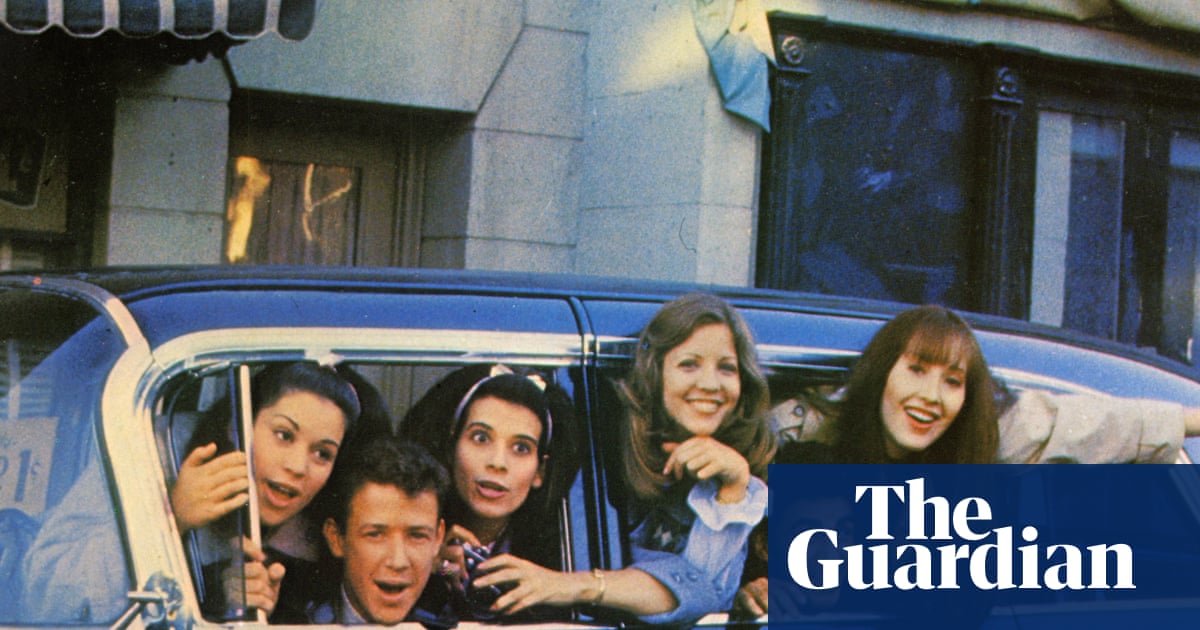When it comes tofeelgood movies, it might not surprise some that a pick would come courtesy ofRobert Zemeckis. After all, he has delighted us with some of cinema’s most enduring and crowd-pleasing blockbusters. But it’s not Back to the Future, Forrest Gump, nor any of the usual suspects who’ve secured spots on IMDb’s all-time favourites lists that I return to when I need a pick-me-up. It’s his very first film, 1978’s I Wanna Hold Your Hand: a criminally underrated gem of a debut that flopped at the box office but has always felt like something close to magic for me.
Set in 1964, it’s as much a madcap comedy romp as it is a sincere ode to fangirls, capturinga day in the life of a riotous group of teenagers in the grip of full-blown Beatlemania. They hatch a plan fuelled by the kind of misguided delusion only teenagers can have: sneak into the Beatles’ hotel via limousine, see them in all their corporeal glory, and by some miracle, score tickets to their legend-making performance on the Ed Sullivan Show.
I first watched the film at the age of 12, having freshly graduated from cutting out One Direction posters in magazines to diving headfirst into Beatlemania myself. In my last piece, I told you to “stop screaming about the Beatles biopics”, but I must confess: my own screaming about the band hasn’t let up since I first got hooked on Rubber Soul. Though I’m a gen Z-er, born in 2003 and decades late to the party, Zemeckis’s evocative portrait of girlhood obsession’s delirium reminds me there’s something timeless – and a little bit holy – about being a fan.
He transports us to a small record store in suburban New Jersey where cultlike hysteria is already in full swing. Swarms of teenage girls are clobbering each other for the latest copies of Meet the Beatles. But no one’s louder (or more unhinged) than Rosie (Wendie Jo Sperber), who lets out a mighty squeal: “Oh my god! It’s Paul, it’s Paul! I’m gonna die right here!” Her friend Pam (Nancy Allen), resisting the tide of her inner Beatlemaniac, flatly replies: “He’s cardboard.” As we meet the rest of the gang, it’s clear a mere cardboard cutout just won’t do.So they pile into a hearse – not quite the limo they hoped for – but thanks to their naive, unlicensed classmate Larry (Marc McClure), they swing and swerve their way to New York.
Each character has a motive for making the pilgrimage: Janis (Susan Kendall Newman), a Joan Baez-loving activist convinced the Beatles are a corporate ploy, is set on picketing. Grace (Theresa Saldana), an aspiring photographer, is after career-making shots. But then there’s Tony Smerko (Bobby Di Cicco), a tough-talking greaser who swears the band’s haircuts alone threaten masculinity – yet tags along anyway.
The next 90 minutes are pure, sugar-rush mayhem and all supercharged by a soundtrack ofrealBeatles songs – a rare delight you can’t get on a low budget today. As they dash up and down elevators, hotel lobbies and the Beatlemaniac-flooded streets of Manhattan, all while dodging police officers and hotel staff, you can’t help but root for them. The funniest scene features Pam slipping into the band’s hotel suite in a room service cart, where she undergoes what can only be described as an awakening. She writhes and crawls to McCartney’s Höfner bass, kissing and caressing it (after stashing her engagement ring in her shoe, of course), then collapses in ecstasy. It’s absurd, it’s hilarious, but it also feels strangely sincere.
Though the fun hinges on the fever pitch of the Beatles’ arrival in the US, they’re only ever shown through real archival footage, never by actors playing them. Zemeckis gives us glimpses: the backs of their mop-tops obscured through an ajar cupboard door, feet from under a bed, but they remain just out of sight. When a band has been so relentlessly documented, anything less than the real thing can feel like a letdown. The film recognises that the Beatles’ appeal lies in their existence on a higher plane – almost too towering, too universally adored and mythic to distil on celluloid. Its brilliance is Zemeckis turning his lens on the effect they’ve had onusby centering the very people who made them a cultural force: the fangirls.
Even at the height of their parasocial hijinks, Zemeckis never treats girlhood obsession with a hint of mockery or condescension. Rather, it’s an affectionate celebration of what it means to be a fan – its heady thrills and innate universality – as hilarious as it is relatable. I wasn’t born anywhere near the 60s, but every time I rewatch I Wanna Hold Your Hand, I feel like I missed out on all the fun. I would have been diving out of a hearse for concert tickets and trading dodgy memorabilia too.
Despite being about one of the world’s most famous fan clubs, I feel like I’m part of a secret one just for this film – championing its under-appreciated, fizzy charm to those yet to experience it.
